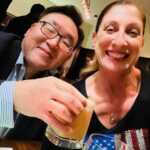Jim O’Dell, MD, discussed these findings in his July editorial in The Rheumatologist (p. 4). In his homage to David Letterman, Jim listed his top ten reasons why rheumatologists are the happiest specialty. At Number 5 was the observation that, “rheumatology self-selects happy people.” I wondered whether this could be true. The data are obviously scant. I recently had lunch with a junior resident in internal medicine who decided that she wants to become a rheumatologist. She was smart, vivacious, and enthusiastic. Her broad smile never left her face and it made me realize that she had the makings of a great rheumatologist. I think that Jim’s observation is spot on. Maybe it is nature and not nurture that explains “the rheumatologist’s bliss.”
Nature or Nurture?
The field of molecular psychopharmacology has studied the genetics of happiness and some rather interesting data has recently emerged. A group of Dutch investigators have used their nation’s twin registry, comprising over 12,000 twins and siblings, to create a genetic model of happiness.2 The heritability of happiness was estimated to be 22% for males and 41% for females. To identify the genomic regions contributing to this heritability, a genome-wide linkage study for happiness was conducted in sibling pairs. One linkage signal was detected at the end of the long arm of chromosome 19 and a second one was observed on the short arm of chromosome 1.
An American case-controlled association study found that individuals with the transcriptionally more efficient version of the serotonin transporter gene, 5HTTLPR, reported significantly higher levels of life satisfaction.3 Other investigators are focusing on the role of the gene expression regulator, microRNA, as a potential therapeutic target for the treatment of mood disorders. Yet, all these studies caution that, at most, the heritability side of the happiness equation accounts for about 40%. So what about environmental factors?
I thought that it might be helpful to look for clues as to how the environment may shape happiness by reviewing some of the personal statements submitted by prior applicants to our rheumatology fellowship program. I was not deterred by the findings of a previous British study that evaluated whether long-term unhappiness and dissatisfaction with medicine could be predicted by analyzing the applicant’s personal statement written fifteen years earlier.4 The authors could not find such an association. I have found that these short essays provide the reader with some context about the applicant’s personality. Though the opening paragraph can be a bit formulaic (“I learned all about lupus through the eyes of my aunt,” or, “There is nothing more elegant in biology than the T-effector cell”), later paragraphs tend to become more revealing.



